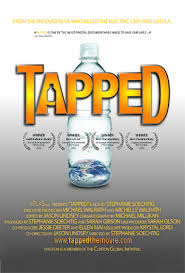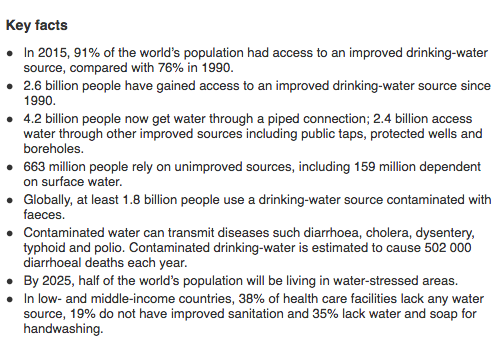A comment on my post last week about the environmental commitment of Nestlé questioned the very premise of that commitment because of the company’s active involvement and development of the international bottled water industry which is expected to reach $ 280 Billion by 2020. As the issue provokes deep discussion on both sides of the debate, I thought I would devote this week’s blog to the topic and see how far I could get on unpacking the situation.
Bottled Water is the Devil
 On one side is a passionate group of activists who are convinced that Bottled Water is a terrible thing and should not be supported or condoned. The criticism includes the energy used to run the supply chain of the industry, the manufacture and disposal of the bottles, possible harmful interactions between the plastic and the water, and the control and the access to springs and ground water resources at the source. A deeper issue is that water is a human necessity and access to clean drinking water a human right. Using this line of thinking it is simply wrong to privatize such a right. A good example of this point of view can be found below:
On one side is a passionate group of activists who are convinced that Bottled Water is a terrible thing and should not be supported or condoned. The criticism includes the energy used to run the supply chain of the industry, the manufacture and disposal of the bottles, possible harmful interactions between the plastic and the water, and the control and the access to springs and ground water resources at the source. A deeper issue is that water is a human necessity and access to clean drinking water a human right. Using this line of thinking it is simply wrong to privatize such a right. A good example of this point of view can be found below:

Longer documentaries such as Tapped (2009) and Bottled Life (2012) go into these issues and Bottled Life targets Nestlé specifically.
Bottled water is just another soft drink
Nestlé chose not to participate with the makers of Bottled Life and maintains that it is politically motivated, biased, misleading and factually wrong. Nestlé’s chairman, Peter Brabeck-Letmathe writes a cogent critique of the film and defense of the industry that can be found here. The company’s position is also presented in a Q and A format here.
At the heart of the defense of the industry is the idea that bottled water is just another soft drink and healthier than soda. People like packaged drinks so the industry argues that it is doing something good for society by offering a cleaner, simpler alternative. Nestlé, like its competitors, is fully compliant with local and national legal systems and goes out of its way to be a good corporate citizen. One of the ironies of the industry is that nobody is attacking soft drink or beer manufacturers over the water they use which makes up most of their products!
What to think ?
Bottled water uses just a tiny fraction of the world’s fresh water and, as discussed some months ago, there is an overwhelming need to tighten up and maintain the water systems in many developed countries and build out the infrastructure in many developing nations. One of the issues in the bottled water debate is that by providing quality drinking water to those that can afford it, the water industry is allowing local elites to opt out of the problem and thus they will not push their political leaders to spend money and energy on improving the public systems.

According to the United Nations and the Word Health Organization, the overall situation in fresh water is improving on a planetary level but there is still much to do. A snapshot from the latest data sheet is shown to the right and UN Water and be accessed here.
While I certainly see both sides of the bottled water issue clearly, it seems that it is sensible to continue to invest in providing clean water to all as a basic pillar of civil society. At the same time, the idea that there is a dark conspiracy to control the source of all life is clearly overblown and exaggerated.
Clearly the situation is different around the world as parts of the planet are water rich and others are experiencing extreme conditions which will likely get worse over time.
Personal Choice
At the Doing Good Doing Well Conference recently held at IESE and organized by our MBA students, hard plastic re-usable bottles were given out and filtered water provided in bulk at re-filling points. The point the students were making is that all of us can choose to use more or less plastic and the best place to start changing the world is with our personal consumption habits. The bottled water business depends on people’s consumer preferences and if people feel strongly about the issue, then they should simply order tap water or buy a filter if they can afford one.

